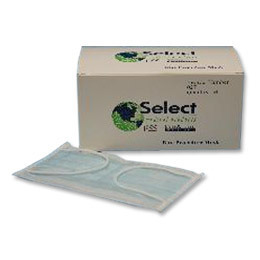Tristate Machinery Dismantlers Forum > ILLINOIS
> Machine Parts
> New
> Without Warranty
> Select earloop surgical face mask 50 per box
Select earloop surgical face mask 50 per box
* Manufacturer: Select Medical
* Provides durable protection and a comfortable fit
* Designed to provide an effective facial fit as required for proper respiratory protection against dust and certain airborne pathogens
Frequently Ask Questions About N95 Respirators and Facemasks from www.FDA.gov.
Q: What is the difference between a facemask and an N95 respirator?
A facemask is a loose-fitting, disposable device that creates a physical barrier between the mouth and nose of the wearer and potential contaminants in the immediate environment.
If worn properly, a facemask is meant to help block large-particle droplets, splashes, sprays or splatter that may contain germs (viruses and bacteria) from reaching your mouth and nose. Facemasks may also help reduce exposure of your saliva and respiratory secretions to others.
While a facemask may be effective in blocking splashes and large-particle droplets, a facemask, by design, does not filter or block very small particles in the air that may be transmitted by coughs, sneezes or certain medical procedures. Facemasks also do not provide complete protection from germs and other contaminants because of the loose fit between the surface of the facemask and your face.
An N95 respirator is a respiratory protective device designed to achieve a very close facial fit and efficient filtration of airborne particles. In addition to blocking splashes, sprays and large droplets, the respirator is also designed to help prevent the wearer from breathing in small particles that may be in the air.
To work as expected, an N95 respirator requires a proper fit to your face. It is designed to fit tightly over your mouth and nose, with no gaps. And gaps will allow air to pass around and reach your nose, mouth, and lungs without being filtered.
The N95 designation means that when subjected to careful testing, the respirator blocks at least 95 percent of small test particles. If properly fitted, the filtration capabilities of N95 respirators exceed those of face masks. However, even a properly fitted N95 respirator does not completely eliminate the risk of contracting illness through airborne viral particles.
N95 respirators are not designed for children or people with facial hair. Because a proper fit cannot be achieved on children and people with facial hair, the N95 respirator may not provide the expected protection. Also, people with chronic respiratory, cardiac, or other medical conditions that make it harder to breathe should check with their healthcare provider before using an N95 respirator because the N95 respirator can require more effort to breathe.
Q: Do N95 respirators reduce the chances of contracting the 2009 H1N1 flu virus?
When worn properly, N95 respirators help reduce your exposure to airborne germs. They do not provide complete protection from airborne germs and other contaminants, however. They are one part of an infection-control strategy that should also include frequent hand washing and staying home when sick.
Q: Is it OK to use one disposable N95 respirator for a long time?
Disposable N95 respirators are not intended to be used over long periods of time. If the respirator is damaged, torn or soiled, or if it becomes difficult to breathe while wearing it, remove it and replace it with a new one.
It is important to understand that if you are exposed to infectious material while wearing an N95 respirator, your respirator should be considered contaminated. After you remove it and dispose of it properly, wash your hands thoroughly.
Q: Is it OK to re-use or share a disposable N95 respirator?
Disposable N95 respirators are not intended to be used more than once. They should also never be shared. Their protective capabilities cannot be assured when they are reused either by yourself or another person. Perhaps more importantly, by sharing, one may inadvertently be exposing another person to infectious material.
Q: What is the purpose of the FDA's Emergency Use Authorization for certain N95 disposable respirators?
A: The FDA issued an Emergency Use Authorization (EUA) for certain disposable respirators known as N95 respirators. This EUA permits the deployment of these products, accompanied by fact sheets with information for use during the 2009 H1N1 flu virus emergency, from the Strategic National Stockpile for use by the general public to help reduce wearer exposure to airborne germs during this emergency. The term "general public" in this EUA is broad and includes people performing work-related duties.

